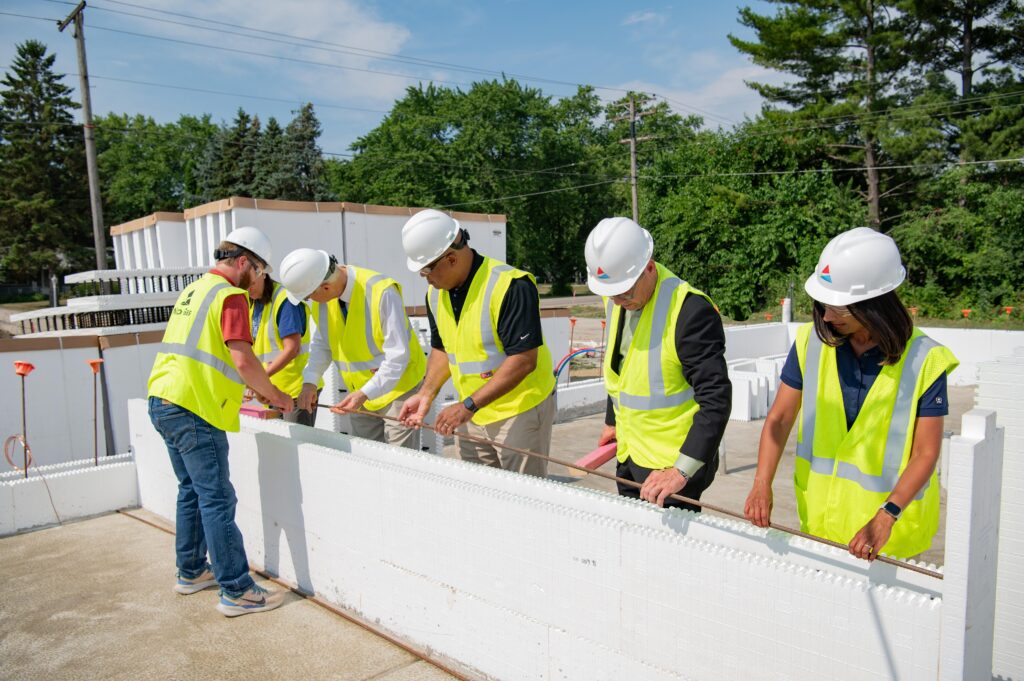Collaborator Spotlight: BuildBlock Building Systems

Nicor Gas is incredibly proud to work with BuildBlock Building Systems. We sat down with Micah Garrett, BuildBlock’s Chief Operating Officer, to hear more about the company and their involvement in the Smart Neighborhood project.

Tell us a little about your company and its mission. What inspired your involvement in the Nicor Gas Smart Neighborhood project?
Micah Garrett: BuildBlock Building Systems was founded in 2004 as a manufacturer of ICFs, which are insulating concrete forms. Based in Oklahoma, we’ve really pioneered the introduction of ICFs to residential and small commercial construction. We’re focused on building structures that are stronger, more efficient and built to last.
Our mission has always been to create better buildings by combining innovation and long-term value. That’s why we’ve had a long-standing relationship with Habitat for Humanity. We both believe that everyone deserves access to quality, resilient housing.
When this opportunity came up to work with Habitat and Nicor Gas, it was an easy “yes.” It’s a chance to be a part of an incredibly innovative project with Nicor Gas, while building homes for Habitat families that are really going to make a difference for the families moving in.
This project allows us to share our expertise, train volunteers and staff and showcase how ICFs play a key role in building a better, long-lasting home.
What specific technologies, products or services are you contributing to the Smart Neighborhood?
MG: BuildBlock is supplying the insulating concrete forms (ICFs) for all 17 homes in the Habitat Green Freedom Smart Neighborhood.
ICFs are a stay-in-force forming system for poured concrete, made up of two insulated panels on either side connected by a web structure. This design allows us to combine multiple phases of the construction process: framing, insulating, sheathing and air sealing.
We stack the forms in the shape of the home, fill it with concrete and end up with a solid, structural wall that’s insulated on both sides and ready for attachments and finishes.
How do ICFs support energy efficiency, resilience or comfort for future homeowners in this community?
MG: ICF walls offer a powerful combination of energy efficiency, resilience and comfort. By forming a tightly sealed, highly insulated building envelope, ICF walls can reduce energy consumption by 30-40%. The continuous insulating on both sides slows the transfer of heat, helping homes stay warmer in winter and cooler in summer—which translates to lower energy bills for the homeowner.
Beyond energy savings, ICF walls also provide superior soundproofing, creating a quieter and more comfortable living environment. They also deliver disaster resilience, making them more resistant to fire, high winds and extreme weather.
For the families moving into the Habitat Green Freedom homes, these benefits translate to real advantages: lower monthly utility bills, improved comfort and peace of mind knowing their home is built to last.
What excites you most about being part of this project that creates smarter, more sustainable housing?
MG: At BuildBlock, we’re passionate about building homes that are both energy-efficient and disaster-resilient—and this project brings that vision to life in a really meaningful way.
It’s exciting to see multiple technologies like ICFs, solar panels and HRV systems working together to create homes that are built to last.
Being part of this project that’s helping to redefine what affordable, energy efficient housing looks like is incredibly rewarding. It’s a win for the homeowners, a win for the community and a win for the future of homebuilding.
How does BuildBlock’s relationship with Nicor Gas and Habitat for Humanity align with your broader goals around innovation or environmental impact?
MG: We believe innovation in construction requires a systems-based approach, one that brings together the right people, technologies and perspectives. That’s why we’re proud to work with Nicor Gas on this project, alongside an incredible team of forward-thinking technology companies.
We are always learning. To be around this caliber of organizations, to really dig into what it means to be “net zero” in a cold climate like Illinois, and to have BuildBlock be involved in every step of the process, it’s been an amazing experience. We’re especially excited about the opportunity this project creates to explore how durable, energy-efficient building materials like ours can support greater energy equity in communities that need it most.
BuildBlock has always been about building structures that are strong, durable and energy efficient for the long term, and this project is a powerful example of that.
Looking ahead, how do you see the technologies or strategies piloted here shaping the future of residential development?
MG: This neighborhood is a real-world demonstration of how forward-thinking building strategies like ICFs can redefine what’s possible in residential construction. ICFs offer durability, energy efficiency, comfort and long-term resilience, all in one system. It’s not about building a home for the next 10 or 20 years, it’s about building homes that will stand strong for generations.
In this neighborhood in Aurora, we’re showing what the future of housing can and should look like: sustainable, affordable and built to last.
Our hope is that this project sparks broader interest in ICF construction and inspires builders, developers and policymakers to reimagine the standard for what quality housing can deliver.
